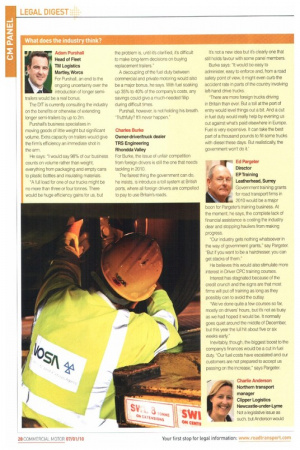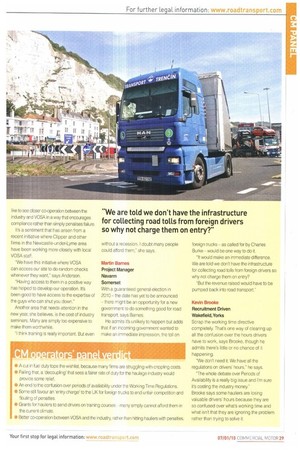Head of Fleet TM Logistics Medley, Worcs For Purshall, an
Page 28

Page 29

If you've noticed an error in this article please click here to report it so we can fix it.
end to the ongoing uncertainty over the introduction of longer semitrailers would be a real bonus.
The DfT is currently consulting the industry on the benefits or otherwise of extending longer semi-trailers by up to 2m.
Purshall's business specialises in moving goods of little weight but significant volume. Extra capacity on trailers would give the firm's efficiency an immediate shot in the arm.
He says: "I would say 98% of our business counts on volume rather than weight, everything from packaging and empty cans to plastic bottles and insulating materials.
"A full load for one of our trucks might be no more than three or four tonnes. There would be huge efficiency gains for us, but the problem is, until its clarified, it's difficult to make long-term decisions on buying replacement trailers."
A decoupiing of the fuel duty between commercial and private motoring would also be a major bonus, he says. With fuel soaking up 35% to 40% of the company's costs, any savings could give a much-needed fillip during difficult times.
Purshall, however, is not holding his breath. "Truthfully? It'll never happen."
Charles Burke Owner-driver/truck dealer TRS Engineering Rhondda Valley For Burke, the issue of unfair competition from foreign drivers is still the one that needs tackling in 2010.
The fairest thing the government can do, he insists, is introduce a toll system at British ports, where all foreign drivers are compelled to pay to use Britain's roads. It's not a new idea but Ws clearly one that still holds favour with some panel members.
Burke says, "It would be easy to administer, easy to enforce and, from a road safety point of view, it might even curb the accident rate in parts of the country involving left-hand drive trucks.
"There are more foreign trucks driving in Britain than ever, But a toll at the port of entry would level things out a bit. And a cut in fuel duty would really help by evening us out against what's paid elsewhere in Europe. Fuel is very expensive. It can take the best part of a thousand pounds to fill some trucks with diesel these days. But realistically, the government won't do it.'
Ed Pargeter Director EP Training Leatherhead, Surrey Government training grants for road transport firms in 2010 would be a major boon for Pargeter's training business. At the moment, he says, the complete lack of financial assistance is costing the industry dear and stopping hauliers from making progress.
"Our industry gets nothing whatsoever in the way of government grants," say Pargeter. "But if you want to be a hairdresser, you can get stacks of them.'
He believes this would also stimulate more interest in Driver CPC training courses.
Interest has stagnated because of the credit crunch and the signs are that most firms will put off training as long as they possibly can to avoid the outlay.
"We've done quite a few courses so far, mostly on drivers' hours, but it's not as busy as we had hoped it would be. It normally goes quiet around the middle of December, but this year the lull hit about five or six weeks early."
Inevitably, though, the biggest boost to the company's finances would be a cut in fuel duty. "Our fuel costs have escalated and our customers are not prepared to accept us passing on the increase," says Pargeter.
like to see closer co-operation between the industry and VOSA in a way that encourages compliance rather than simply penalises failure.
It's a sentiment that has arisen from a recent initiative where Clipper and other firms in the Newcastle-under-Lyme area have been working more closely with local VOSA staff.
'We have this initiative where VOSA can access our site to do random checks whenever they want," says Anderson.
"Having access to them in a positive way has helped to develop our operation. It's been good to have access to the expertise of the guys who can shut you down."
Another area that needs attention in the new year, she believes, is the cost of industry seminars. Many are simply too expensive to make them worthwhile.
1 think training is really important. But even
without a recession, I doubt many people could afford them," she says.
Martin Barnes Project Manager Navarm Somerset With a guaranteed general election in 2010 the date has yet to be announced there might be an opportunity for a new government to do something good for road transport, says Barnes.
He admits it's unlikely to happen but adds that if an incoming government wanted to make an immediate impression, the toll on foreign trucks as called for by Charles Burke would be one way to do it.
"It would make an immediate difference. We are told we don't have the infrastructure for collecting road tolls from foreign drivers so why not charge them on entry?
"But the revenue raised would have to be pumped back into road transport."
Kevin Brooke Recruitment Driven Wakefield, Yorks
Scrap the working time directive completely. That's one way of clearing up all the confusion over the hours drivers have to work, says Brooke, though he admits there's little or no chance of it happening.
"We don't need it. We have all the regulations on drivers' hours," he says.
"The whole debate over Periods of Availability is a really big issue and I'm sure it costing the industry money."
Brooke says some hauliers are losing valuable drivers' hours because they are so confused over what's working time and what isn't that they are ignoring the problem rather than trying to solve it.




























































































































